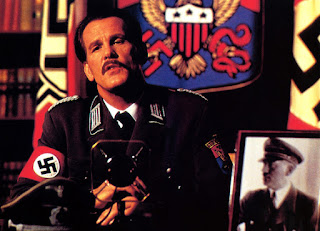Earlier this year my wife and I got to revisit one of the nightmares of our childhoods: the possibility of a nuclear war between the United States and (post-Soviet) Russia. The Russian invasion of Ukraine and media speculation about NATO intervention spooked us both, and we stockpiled canned water and iodine tablets and discussed possible evacuation plans. I’m sure our preparations would seem silly to younger readers who don’t remember the Cold War, and to older readers who have forgotten the intensely nihilistic dread generated by that conflict’s final phase. Myself, I’m not so embarrassed. (1)
 |
| We will all go together when we go. |
To those of us who came of age in the 1980s, when Insane Anglo Warlord (2) stood at the helm of the United States and a succession of frightened old men ruled the Soviet Union, when a new arms race raised the world’s megatonnage to the “general extermination” level, nuclear annihilation seemed more likely than not. Two decades earlier, in the aftermath of the Cuban Missile Crisis, relieved Americans could laugh at Dr. Strangelove and play satirical card games like Nuclear War. In the detente era of the 1970s, nuclear war could appear in movies as the comic backdrop to gonzo adventure stories (like A Boy and His Dog or Damnation Alley). TSR Hobbies could produce a whimsical post-apocalyptic role-playing game like Gamma World and expect it to garner a large following. After 1980, though, armageddon no longer raised much of a chuckle.
The ensuing decade gave us The Day After (3) and Britons’ even bleaker Threads (1984), as well as Testament (1983), a grim little existentialist masterpiece. Science fiction and scifi-adjacent writers warned us that the next war would be the last one; at best, life in the aftermath would be squalid and bleak. So wrote Connie Willis, in “A Letter from the Clearys”; John Varley, in “The Manhattan Phone Book, Abridged”; Gregory Benford, in “Fermi and Frost”; David Brin, in The Postman; Whitley Streiber, in his near-future travelogue War Day; and James Morrow, in his powerful This Is the Way the World Ends. The most distinctive nuclear-war game of the decade was Balance of Power (1985), a simulation of Cold War political conflict that the player immediately lost if s/he started a world war. Whatever civics lessons we received in school and from television, American teenagers knew that our regime, with the help of the Russians, could kill all of us with our families at any time, and that there was absolutely nothing we could do about it. No wonder Gen Xers were so politically apathetic, and no wonder so many of us still fondly remember Mikhail Gorbachev, who ended the arms race and let us grow up. (4)
 |
| You lost, Ronnie. (From Balance of Power) |
I do know one person who would not have laughed at Susan’s and my halting war preparations: my late mother, a hard-nosed Reagan Republican who nonetheless came to fear, in the fall of 1983, that there was a reasonable chance of a nuclear war sometime in the near future. She made a family stockpile of canned food, bottled water, and other supplies, which she stored in a closet for the next decade. In hindsight, one might say she was overreacting to news stories like the Soviet air force’s downing of KAL 007, a passenger airliner with 270 people (including 62 Americans) aboard. With additional hindsight, one can say she was perfectly right to be afraid. In the fall of 1983 a NATO wargame called Able Archer persuaded the addled leadership of the Soviet Union that the Americans were preparing a nuclear first-strike. The USSR in response placed its own nuclear forces on high alert. The world came closer to destruction than at any time since 1962, and, national security services being what they were, very few people learned about it until recently. I suspect we won’t know for another two or three decades exactly how close the Russo-Ukrainian War has brought us to a nuclear exchange. Experience suggests it was closer than we might think. Funny, isn’t it?
 |
| This is somewhat less than reassuring. |
*
1 Admittedly, preparing for nuclear war would have seemed futile to me as a teenager, but one’s calculus changes as a middle-aged parent.
2 Anagram of Ronald Wilson Reagan.
3 Ben Stein, who found The Day After unpatriotic, helped produce a “Better Dead Than Red” response called Amerika (1987). In this miniseries the Soviet Union conquers the United States and then proceeds to bore everyone in America to death.
4 He thereby helped end Jerry Pournelle’s interminable There Will Be War series, for which he should have won a Special Prize for Literary Merit.


